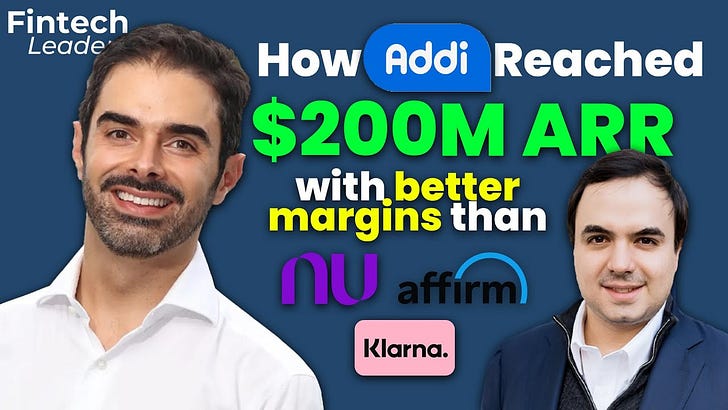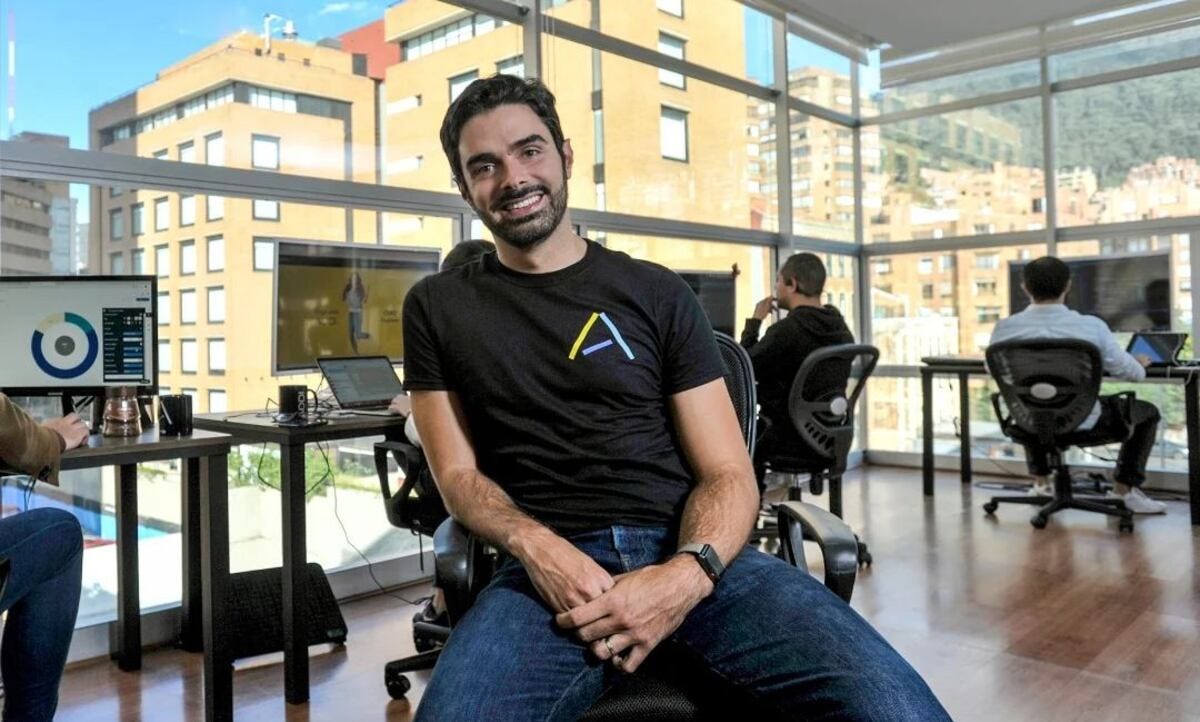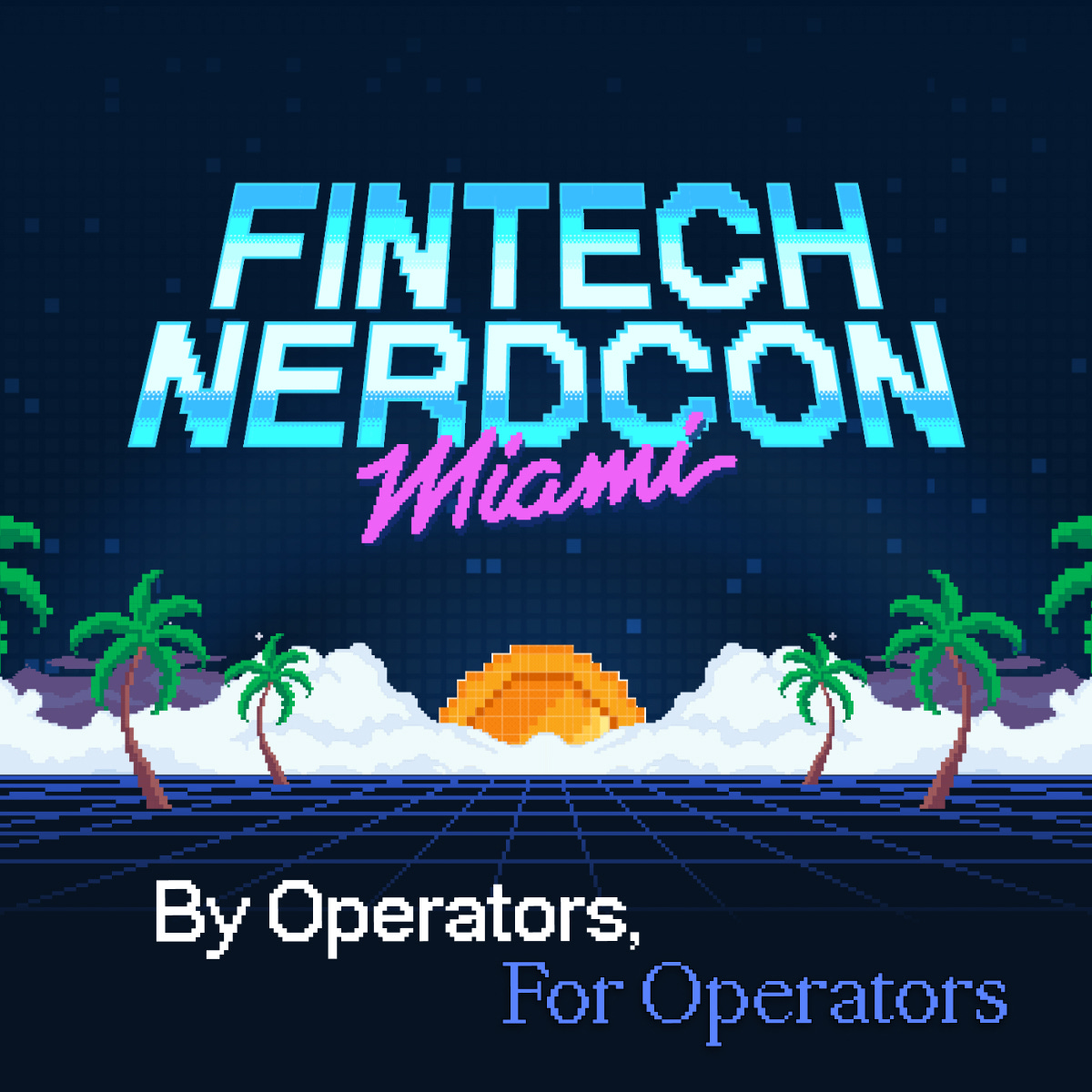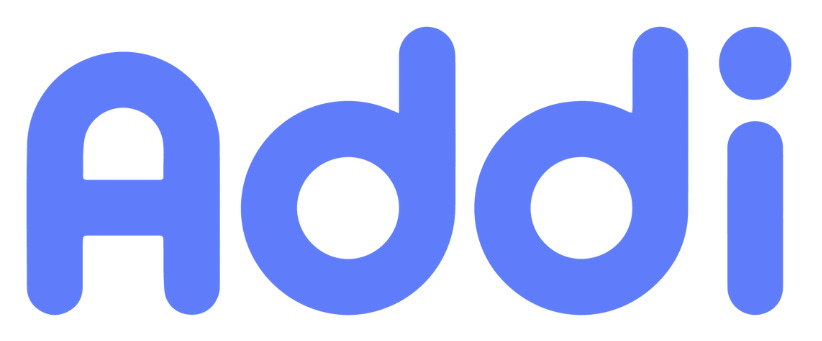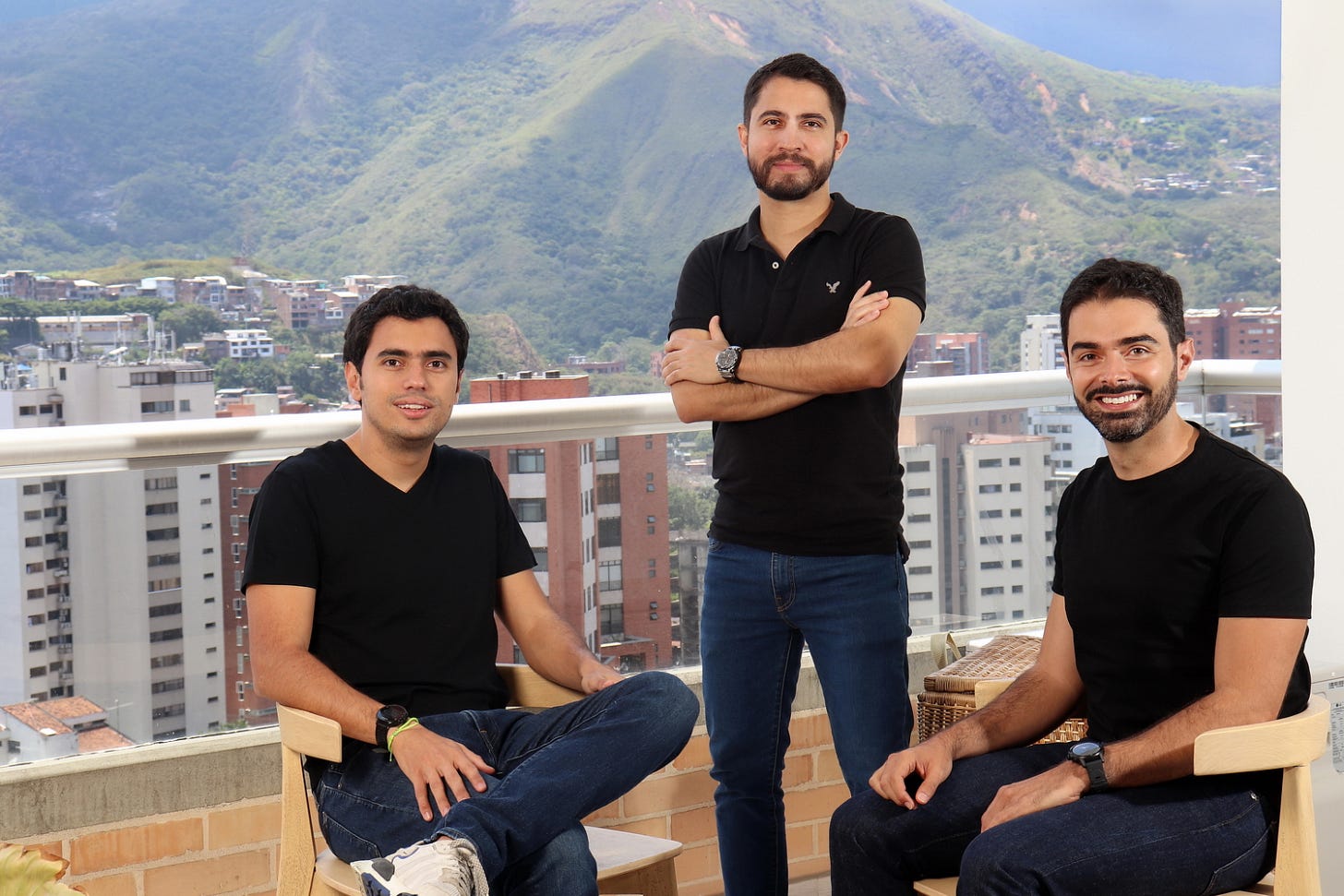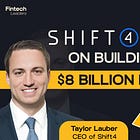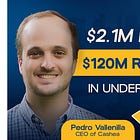This article is part of Fintech Leaders, a newsletter with 80,000+ builders, entrepreneurs, investors, regulators, and students of financial services. I invite you to share and sign up. If you enjoy this conversation, please consider leaving a review on Apple, Spotify, or Youtube.
Addi was co-founded by Santiago Suarez and Daniel Vallejo in 2018. What started as a buy now, pay later product has evolved into a $200 million profitable ecosystem serving 2.5 million customers and 30,000 merchants across more than 1,000 cities. They are backed by Andreessen Horowitz, Union Square Ventures, GIC, Monashees, Greycroft, and many more.
Santiago’s journey from raising three rounds in nine months to exiting Brazil and achieving profitability has taught him many lessons into radical focus, extracting value from boards, and building data infrastructure before the AI wave. In our conversation, Santiago walks through Addi’s transformation from regional ambitions to single market dominance, the counterintuitive power of “dirty laundry” board meetings, and why saying NO is crucial to your survival.
Below are four of the most impactful and actionable insights from our conversation. If you’re eager for more, the full discussion awaits:
Treat Your Board as True Insiders, Not Fundraising Targets
Most founders treat board meetings like polished performances, carefully curating what to share. Santiago Suarez took the opposite approach. When fintech funding collapsed in 2022, he increased board meeting frequency from quarterly to monthly. These weren’t formal affairs. Suarez and his co-founder spent two hours compiling a two to three page update on the last 30 days, then held an optional 30 minute call. This monthly cadence transformed quarterly meetings entirely. Instead of catching the board up on basics, Suarez could dive deep into strategic topics. But the real shift came in framing. Rather than presenting wins and glossing over challenges, Suarez turned every board meeting into a “dirty laundry event” focused almost exclusively on what’s not working and where the company needs help.
The payoff has been transformative. Suarez specialized board members based on expertise. Ian Forrester from Capital One informally chairs the risk committee. John Buttrick at Union Square Ventures handles capital markets. Chris at GIC advises on buy now, pay later. One board member even told Suarez: “I don’t go to your board meetings wondering what you’re not saying. I go in knowing exactly what’s happening.” That shift from suspicion to trust unlocks better advice, faster decisions, and access to world class talent. It’s the difference between treating your board as overseers and treating them as your most valuable advisors.
The Power of a Single North Star Metric Over Quarterly OKRs
Four years ago, Addi operated like most startups: quarterly OKRs, multiple priorities, constantly shifting focus. Then in 2022, as funding dried up, Santiago made a radical decision. He eliminated OKRs and replaced them with a single North Star metric for two years: profitability. Not revenue growth, not customer acquisition. Just profitability. From August 2022 to August 2024, that was the only metric that mattered. The clarity was immediate. Every decision about hiring, marketing, product, or expansion became simple: does this move us toward profitability or away from it? If away, the answer was no.
In August 2024, once profitability was sustained, Addi switched its North Star to engagement. Santiago explained that profitability remains important, but now the single most important metric is how deeply customers use the platform. This annual review is critical. The North Star isn’t permanent, but it isn’t constantly shifting either. Suarez reviews it once per year. The rule is simple: one North Star, reviewed annually, never multiple competing priorities. It’s the antithesis of tracking ten metrics and hoping something works. Instead, it forces the entire organization to align behind one definition of success at a time.
I’m proud to be a attending Fintech NerdCon, happening Nov 19-20 in Miami! 🎉
This isn’t your typical fintech event; it’s made for builders and problem-solvers who want deep dives over surface-level panels.
Expect hands-on workshops, honest conversations, and insights you can actually use.
🤓Use the discount code, NERD20 for 20% off tickets.
More info here: 👉 https://www.fintechnerdcon.com/
Build Your Data Infrastructure Before You Need It
In 2018, Addi’s CTO Carlos made two architectural decisions that seemed overly complex for a young startup. First, a monorepo: a single code repository like Google and Anthropic use, rejected by most startups for faster microservices. Second, an event based architecture logging every platform action. By 2021, three years before ChatGPT, Carlos built a massive data ingestion layer processing billions of events into queryable tables. Today, Addi has over 10 billion logged events and 50 terabytes of queryable data no Colombian competitor possesses. Because Addi controls the entire stack as issuer, network, processor, acquirer, and marketplace, it captures data traditional players can’t. For 30% of transactions, it even captures SKU level data: not just shoes, but white Nike shoes in size 37.
When LLMs arrived, Addi was ready. The company now runs over 50 AI agents. Agents predict purchases, respond to complaints, generate credit model features. An AI agent named Audrey handles 70% of customer service interactions with 78% satisfaction, keeping headcount flat as volumes doubled and customers grew 50%. Addi has saved over 50 full time employees in 2025 alone, growing weekly. None of this would be possible without infrastructure decisions made in 2018 and 2021, long before the AI wave. The lesson is clear: build your data infrastructure before you need it, because by the time you need it, it’s too late.
Eliminate What Drains Your Energy, Even If It’s “Best Practice”
By late 2023, Santiago Suarez was burnt out. Addi had exited Brazil after moving families there. The company completed a difficult down round. Revenue hit $30 million, and investors said that might be Colombia’s ceiling. When Suarez analyzed what drained him most, he landed on something unexpected: one on ones with direct reports. He hated them. They felt like obligations rather than productive conversations. So he eliminated one on ones entirely. This wasn’t about becoming unavailable. Suarez remains accessible via WhatsApp and Slack to all 11 direct reports. But he shifted to natural rhythms. Some weeks he’ll talk to a direct report twice daily. Other times, two weeks pass. The seven hours per week he reclaimed mattered less than the energy he got back.
The burnout cure came from getting physically closer to the product. In early 2024, Suarez declared every Wednesday as Field Day. He’d wear the Addi field team jacket and visit random merchants across Colombia, watching customers use the product and recording what worked and what didn’t. When a merchant complained about callbacks, he’d phone the responsible team member immediately. By year end, he could see the flywheel working: merchants calling unprompted, customers using the platform daily, the business compounding. The combination of eliminating energy drains and reconnecting with the product pulled him out of burnout. He also credits building a contentious management team from Capital One, Amazon, and Paytm who tell him no constantly. Their job is execution and saying no. His job is vision and lobbying for yes.
The Unfiltered Q&A: Santiago Suarez on Building Addi
The four principles above shaped Addi’s turnaround. But principles without context are just platitudes. What follows is the unfiltered account of how these ideas emerged: the board conversations that changed everything, the burnout that nearly broke him, the data bets that seemed crazy in 2021, and the fundraising decisions that saved the company.
Miguel Armaza: I know some of your board members, and I talked to some of them in preparation for this call. Something they consistently said was, you are very good at extracting value from your board and your investors. Maybe share your approach to your relationship with your board?
Santiago Suarez: We see our board as two things. Number one, they are incredible network connectors. We’re lucky enough to be venture funded. We have some of the world’s best investors on our board: Andreessen Horowitz, GIC, Union Square. So I start from the premise that these people know the best at whatever it is we need. In fact, one of the values we have at the company is we obsess with and hone our craft. The example I give people all the time is, do you know who’s best in the world at your job? Who is the best CMO in the world? Find that person. Now we’re going to get you access to that person. Who is the best head of lending in the world? Sometimes best in the world is in India, in Kazakhstan, Indonesia.
The second thing, very tactical, is we actually increased the frequency of our board meetings in 2022 when the whole money went away. I reached out to the board and said, guys, I want to meet monthly. It’s optional. We give you the metrics, a two pager, maybe three pager. It’s the same thing. Good discipline for us. Takes about two hours to put together. But that means when we meet on a quarterly basis, we don’t have to catch you up on the business. You already know the business, so we can go deep on a certain topic.
The third thing we’ve done is we’ve started to specialize folks in different things. We brought Ian Forrester, a senior executive at Capital One, as our independent who informally chairs our risk committee. We got John at Union Square who was on the board of Lending Club when they went public. He knows everything about capital markets and lending questions. We got Chris at GIC, largest shareholder in Affirm outside Max Levchin. He knows everything about BNPL.
The other thing we’ve done is we treat the board as true insiders. One piece of advice I got from a very well known Latin American entrepreneur was treat every board meeting as a fundraising event. We treat every board meeting as a dirty laundry event. We always say, this is not working. This is not working. This we need help, and this is bad. Sometimes we don’t even celebrate. We turned profitable for now four quarters. We probably discussed it for five minutes at the board level. What’s not working? That has two benefits. One, you get better advice, but secondly, much higher trust. This feedback I got from our board members: I don’t go to your board meetings wondering, what is he not saying? I go in being like, okay, this is what’s happening.
Miguel Armaza: Another thing that I understand you do very well is the bar of saying no. You’ve said no to markets, you say no to things every day. Talk about your philosophy of saying no.
Santiago Suarez: If you ask half my management team, they might say he still says yes too much. The core philosophy of saying no starts with this: three years ago, we made the decision to move away from objectives to North Star. We were always talking about OKRs, objectives for the quarter. We now have a single North Star for two years. That North Star was profitability from August 2022 until August of 2024. That was the single North Star. Now we do engagement. We explained to the company, it’s not like we no longer want to be profitable. It’s just that the single most important metric is engagement, and we review it every year.
The second thing is you want to have an extremely contentious—and I say that with love—management team. Our head of lending, Jayesh, is a 25 year veteran of the industry, 10 years at Capital One. He actually built Paytm’s BNPL business from zero to 25 million accounts in India. Manish just joined from Amazon. He spent 15 years at Amazon, led payments globally for Amazon, four years at Block. These guys, I joke, always tell me no. All I do is lobby. But that’s actually what you want in a management team. You want the founder to be setting the vision pushing, and you want really grounded, high execution folks.
The last thing around the power of saying no is we get together twice a year, and we say, what are we doing? What are we not doing? And we plan on half year cycles. But that being said, I don’t think there’s such thing as too much focus. North Star, management team, high trust, high integrity dynamics, not only in the boardroom but also within the management team.
Miguel Armaza: I think that’s a good place to talk about your vision, because a few years ago, you were planning to build, at a minimum, a regional business, and you had a big operation in Brazil. Obviously, you said no to Brazil. Now you’re doubling down on Colombia. But the vision has also changed. You’ve been inspired by some other companies, especially coming from Eurasia. And I kind of know the answer, but I want to hear from you.
Santiago Suarez: What we’ve realized, and this was also 2022 early 23, you have to understand, no one knew Caspi. Caspi is this Kazakh based public listed company. They were not listed on NASDAQ, and I have one of my favorite investors. These guys are based out in Eurasia, and they’re always two or three years ahead of the track. They’ve been ahead on quick commerce. They’ve been ahead on things. And they called me up. I remember they said, this is it. I think we figured it out. I said, okay, great. What is it? Here you go. There’s this company. It’s like, awesome. So we learned a little bit, and we realized we’re the same raw materials.
But to the vision, what is our vision? We want to become the financial and commerce platform for Colombians, for everyday commerce, and eventually for other countries. For the first time, we’re starting to think about, where would we take this ecosystem? So it’s no longer about being a thin layer of I’m just a BNPL. I provide no, it’s about I have some consumers. I’ve got some merchants. How do I get them to come together every single day for all their needs? Because guess what? They have a lot of similar needs. You’ve got to find each other. You gotta have the right credit solutions. You gotta have the right offer. You gotta have the right spend.
So we wake up every day thinking, how do we make commerce and financial services happen more seamlessly? So we have evolved from just having a BNPL solution to something that has credit, instantaneous payments, working capital solutions for our merchants, a full fledged marketplace that allows them to sell to the customers directly on our app. We’re about to launch our savings account once we obtain final regulatory approval. So it really becomes about using that ecosystem to deliver better service at lower cost, with a better experience to both our consumers and our merchants.
Miguel Armaza: Customer service is one of the first places where LLMs have made an impact. I understand that at Addi, the impact is being felt across the company. Let’s talk about that, because that might be one of the most interesting things that you are doing.
Santiago Suarez: When we started the company in 2018, we hired Carlos, our CTO. He was our second hire. Carlos said we’re going to do two things. We’re going to have a monorepo, which means we only have a single code repository for the entire company. Google works that way. Anthropic works that way. A lot of companies don’t work that way. They go full microservices. That gains speed, but you lose standards, and critically, you lose the ability to have everything in the same place, which is extremely valuable in the age of AI.
The second decision we made was an event based architecture. Every time something happens in this platform, we log an event. Because of the business model I have, I have so much data. If you’re a credit card issuer, you have data for credit history, maybe income data, but you have no data on where you are when you physically buy things. I have the whole thing. I’ve got all the data that an issuer has. I’ve got all the network data. I know when the network moves. For about 30% of my transactions, I even get SKU level data. So not only do I know where you’re buying, I know that you’re buying a pair of white shoes, size 37. Then I also get commerce data: your neighbors, what are they buying? What are you buying?
All of that gets logged and has been logged since the beginning of time on these events. We have over 10 billion events to date. Three plus years ago, we said, events are great, but they’re impossible to query. Carlos embarked on this at the end of 2021, pre LLMs, pre ChatGPT. He built a pretty powerful data ingestion layer. Takes all these events and processes them into queryable tables. That’s over close to 50 terabytes of data. He built an infrastructure so anytime we have a new product, by default that goes into that data.
What we have today is close to 50 terabytes of data that no one has in the country—data from merchants, from e-commerce, from networks, from devices, from the tax authority, all there and we can query. That powers over 50 AI agents. Agents that do everything from figure out what’s your next purchase and show that in your marketplace, to agents that respond to customer complaints. By Colombian law, certain type of customer complaints, if you say PQR, it has to be responded in a legal way. We got a legal agent. We’ve got an agent that takes all this data to create features for our credit and fraud models.
We now have our AI powered agent called Audrey. Audrey processes 70% of all customer interactions with a 78 CSAT. We’ve been able to basically keep our customer service headcount flat, even though our volumes have doubled, our customers have increased by about 50%, and our merchants have close to tripled in that period. For a company that has 590 people, we estimate we have saved over 50 heads so far this year, and increasing by the day thanks to our AI implementations.
Miguel Armaza: What is your reaction when you read of this study, I think it was by MIT, that 95% of AI projects inside companies have failed? To me that sounds more like a problem of the data of these companies and the infrastructure. But what’s your reaction?
Santiago Suarez: My reaction is a bit nuanced, in part because my wife, until very recently, ran a massive AI initiative, and one of her big things was always you can deploy AI extremely quickly, even without having to clean your data. And that is true. So I would say, in some cases true, but in some other cases, when you look at these big AI vendors that are emerging that are sitting between you and Anthropic, Gemini and OpenAI, what they do is good old fashioned systems integration. Build your rag pipelines, call the right data sources, ensure they’re being updated so that your LLM hopefully is not an idiot when it speaks to your customers. So I actually think that process of grabbing the right data, exposing it, and using it to do reinforcement learning is very important.
And by the way, we were very deliberate on this, because we started this big project even before LLMs. We just knew we needed what I’m gonna call a resilient, scalable, durable data infrastructure that we could always use. We use data for everything. We use it to recommend, to underwrite, to approve merchants. We underwrite both merchants and consumers, the whole thing. But when LLMs started, I remember, I said, okay, guys, what are we going to do? And you know, you had all these people putting out press releases. And eventually I’m like, guys, it seems like everyone’s putting these press releases. And I remember Mauro, my head of data, said, we’re going to start with legal. I’m like, why would we start with legal? That feels so low hanging. Why don’t we start with customer service? And he said, you need to build the right pipelines.
And turns out that the legal use case was fantastic, because the legal use case was responding to what we call an escalated complaint, which is when someone is basically saying, I’m going to go to the Consumer Protection Authority, or I may sue you, or whatever. And for a company that processes millions of transactions a month, you get a lot of those, but for you to respond to those things accurately, you need to have phenomenal data. Need to know exactly where the customer file is. What was the situation? When did the approval happen? What loan are we talking about? What merchant? What is the chat history with our customer agents? What is the history with the merchant?
So it turns out, responding to an escalated complaint is a fantastic way of building the right pipelines to then have all your data easily accessible. And once we did that, we saved a few lawyers. Awesome. Otherwise we would have had to linearly scale the number of lawyers responding to complaints. But then we were able to say, now we can turn this around for customer service, and we went from like 20% to again, close to 70% of customer queries handled by Audrey from January to August of this year.
Miguel Armaza: There was a period where I would see you in the news every couple months, and every time was a bigger round. You had three rounds in nine months. Was that a mistake, or was that the right call?
Santiago Suarez: It was definitely the right call. There’s no way I would be here had we not raised all that money. There’s no way we survived. We’ve seen the whole movie, right? We raised like crazy back in the go-go years, and then we did an internal round in 2023 that was lower valuation than the previous fancy round. We took our pain. We decided to take much less structure, as clean as possible, but a lower price. Who cares? We just want to make sure we do right by the business.
In hindsight, what I would even say is we may turn out to be one of those examples where throwing a ton of dollars on lending early on actually builds a scalable, venture backable business. In our case, it’s because we use that to create network effects. I still remember, by the time I crossed about 500,000 to 600,000 customers, merchants that I had been calling for years with no impact started calling us. Top 10 merchant in the country called and said, I’m tired of having customers ask me about your product. When can we integrate? That was the bet all along.
It’s a business with great revenue, phenomenal margins, and now profitable. So no, raising that amount of money wasn’t a mistake. We made many mistakes, but raising the amount of money was definitely not a mistake. We got some phenomenal partners along the way: GIC, Union Square, Greycroft, Andreessen Horowitz. Not only do you get good capital, we got great people around the table.
Miguel Armaza: You mentioned that towards the end of 2023 you felt pretty burnt out. What did you do about it? How did you address the burnout?
Santiago Suarez: I took 10 days off and went couch surfing. That was the tactical thing I did. I think it was also very natural. I had moved to Brazil with Daniel, my co-founder, but also with my family, to make Addi in Brazil a success. We pulled out of the market—the best decision we’ve made, but still a very hard decision. We went all in, we moved our young families, our kids, our wives, everyone, and we just couldn’t make it work. I think there was a little bit of grief. We also had that brutal round. In 2023 we did 30 million of revenue. When we went to a lot of investors, they said, I think that’s the ceiling in Colombia. We’re going to go over 5x that this calendar year. Our run rate is much higher. So you’re sitting there going through some growing pains and it was just a lot.
What really changed for me coming into 2024 was: one, I moved back to Colombia. Two, I got way closer to the product. Our product is awesome. You’re out on field and you see it. You see every street because we created this thing where the Addi logo comes out perpendicular. In the first semester of 2024, every Wednesday I just went out on the field. Every Wednesday was Field Day. I would take videos, record, send voice notes. I’d go into a random store, and the guy would be like, oh, I haven’t received a call back. I’m like, don’t worry about it. Let me call this person. He’s like, who are you? I’m like, oh, I’m the CEO of the company. Our field guys have a little jacket, so I put the jacket on, and that was awesome.
At the end of 2024 we could just see the flywheel working and saying, wow, we can actually build a great business. We’ve built a good business, we can build a great business, and that was also a bit of an inspiration.
Want more podcast episodes? Join me and follow Fintech Leaders today on Apple, Spotify, Youtube or your favorite podcast app for weekly conversations with today’s global leaders that will dominate the 21st century in fintech, business, and beyond.
Don’t forget to subscribe so you don’t miss big conversations and insights with the giants of Fintech.
Previous Episodes You May Enjoy:


